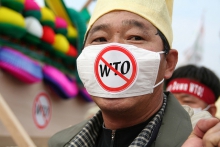This is an archive of news stories and research from the National Union of Public and General Employees. Please see our new site - https://nupge.ca - for the most current information.
Public Services International writes to World Trade Organization (WTo) members urging that they not bow to pressure from G20 countries to accept the proposed Trade Facilitation Agreement without addressing development issues.
 France (24 July 2014)—As Trade Ministers from the G20 countries met in Sydney, Australia, the Public Services International (PSI, a Global Union Federation) sent a letter urging World Trade Organization (WTO) members to make addressing development issues (for example global poverty) a condition of their acceptance of the Trade Facilitation Agreement (TFA).
France (24 July 2014)—As Trade Ministers from the G20 countries met in Sydney, Australia, the Public Services International (PSI, a Global Union Federation) sent a letter urging World Trade Organization (WTO) members to make addressing development issues (for example global poverty) a condition of their acceptance of the Trade Facilitation Agreement (TFA).
The letter was sent to all WTO members to try to ensure that the G20 is not used again to achieve the agenda of the transnational corporations of the developed countries. PSI has long been critical of the WTO for pushing ahead with trade liberalization without adequately dealing with the issues of developing countries.
New Agreement on Trade Facilitation sidelines urgent issues
At the WTO Ministerial held in Bali in December 2013, WTO members agreed to the first expansion of the WTO since its coming into existence in 1995. The new agreement on “Trade Facilitation,” would divert limited resources away from priority development needs such as health, education, and domestic infrastructure investments in least developed countries (LDCs) and developing countries.
As has previously been the case, the issues of urgency for developing countries, such as the G33 proposal to allow developing countries to invest in Food Security, were sidelined at Bali, and the LDC proposals were concluded only in a non-binding way.
Pressure from G20 countries to accept deal
Since the Bali Ministerial, however, developing countries and LDCs have fought to ensure that the new TFA only enters into force when their development demands are also agreed to — that is, to change the most harmful aspects of existing WTO rules.
Outrageously, the Director General of the WTO, Roberto Azevêdo, along with officials from the US, Japan, the EU and other developed countries, have been putting immense pressure on developing countries and LDCs to ‘give in,’ and accept the TFA.
Global fight back
The PSI points out that if this happens, it will be even harder to ensure that the development demandsare ever taken up by WTO members. Many of the development demands are similar to civil society demands, such as changing the agriculture rules to allow developing countries to invest in agricultural production of small farmers for food security –
PSI continues to fight to protect public services from harmful trade agreements, but also fights for the rights of developing nations to benefit from a global trade system that facilitates development.
NUPGE
The National Union of Public and General Employees (NUPGE) is one of Canada's largest labour organizations with over 340,000 members. Our mission is to improve the lives of working families and to build a stronger Canada by ensuring our common wealth is used for the common good. NUPGE
